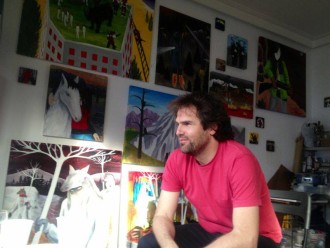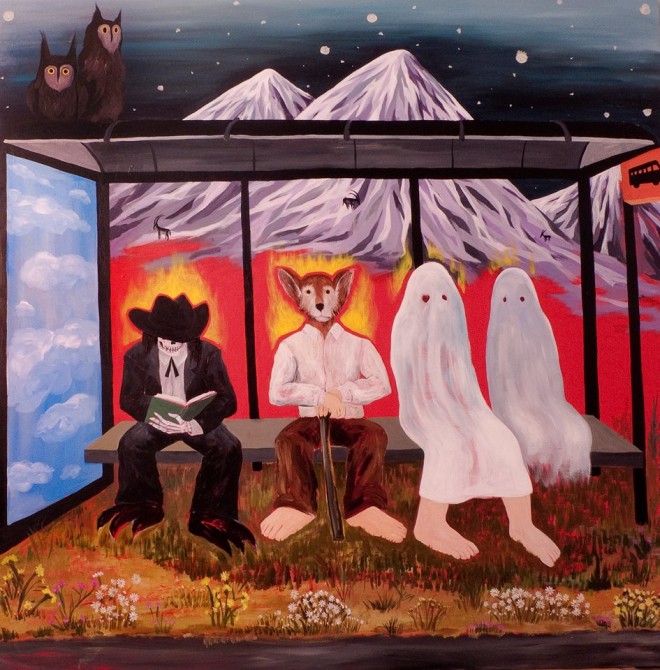Santiago Lara at ART DEMO DAY
Cologne
Santiago Lara plays with the known and the unexpected. The Spanish artist uses an imaginary yet accurate language to depict an art standing in-between a dreamy and real land experimenting with art as a communication tool.
Santiago Lara obtained his art degree at the University Complutense of Fine Arts in Madrid. His pedigree shows a wide recognition with Prizes such as the ‘Grant Leonardo da Vinci of Paris’ in 2002 and the Prize ‘Antonio Lopez Garca’ in 2005. He currently lives and works in between Gijn and Berlin place that impact on his practice as a painter.

From November 21 on, his works will be on display in the group exhibition ART DEMO DAY. Florian Waldvogel, the curator of the show, sat down with Santiago Lara to talk art and politics.
Florian Waldvogel: What has been formative during your studies?
Santiago Lara: During my period of formation in the Faculty of Fine Arts of the Complutense University of Madrid, one of the things that influenced me the most was the relationship with my fellow students. The conversations between us in the workshops and during the outdoor activities such as openings, exhibitions and museums were really inspiring. This exchange of ideas between colleagues has been very important for my later artistic development, shaping a very personal and rich imaginary.
FW: To what extent are social references important for your work?
SL: In my work I use countless social references from elements of the already existing popular culture. In a natural and deliberate way I concentrate several stories in the same pictorial image, as in the case of the representation of the personage of Jesús Malverde, the “narco’s Saint”, a popular personage of the Mexican popular culture that I turn into the patron Saint of the weakest. References to the supernatural is a constant in my work, but from a metaphorical vision that shows our society in a critical and ironic form. I always mix identities that are socially recognized, as in the case of “Bus Stop”, where I painted a portrait of two spectres waiting for a bus that never arrives, one of them is the death dressed as a priest reading a book with green cobras. The colour symbolizes the death in the work of the poet Federico García Lorca.
FW: What is an exhibition?
SL: An exhibition is a complex knot of relations around a fixed idea. This idea, from its starting point to production and final display, has a fixed life and makes several agents interact with each other. We, the artists, are members of an exhibition, but the final work is not the most important thing. The core of an exhibition is the synergies generated around it and the way the spectators complete the aforesaid work. An exhibition is a process where ideas, budgets, social relations and possibilities work in a fixed period of time and in one or several concrete places, where work comes to sense.
Read the interview in German / Zum Interview auf Deutsch

Archive
- Dezember 2016 (1)
- Oktober 2016 (3)
- September 2016 (24)
- Juli 2016 (20)
- Juni 2016 (24)
- Mai 2016 (18)
- April 2016 (18)
- März 2016 (21)
- Februar 2016 (11)
- Januar 2016 (20)
- Dezember 2015 (20)
- November 2015 (37)
- Oktober 2015 (30)
- September 2015 (24)
- August 2015 (4)
- Juli 2015 (30)
- Juni 2015 (9)
- Mai 2015 (17)
- April 2015 (23)
- März 2015 (18)
- Januar 2015 (8)
- Dezember 2014 (1)
- November 2014 (3)
- Oktober 2014 (10)
- September 2014 (4)
- August 2014 (2)
- Juli 2014 (3)
- Juni 2014 (2)
- Mai 2014 (5)
- April 2014 (11)
- März 2014 (12)
- Februar 2014 (13)
- Januar 2014 (10)
- Dezember 2013 (5)
- November 2013 (13)
- Oktober 2013 (24)
- September 2013 (18)
- August 2013 (26)
- Juli 2013 (13)
- Juni 2013 (35)
- Mai 2013 (44)
- April 2013 (49)
- März 2013 (61)
- Februar 2013 (54)
- Januar 2013 (46)
- Dezember 2012 (50)
- November 2012 (58)
- Oktober 2012 (62)
- September 2012 (61)
- August 2012 (63)
- Juli 2012 (64)
- Juni 2012 (61)
- Mai 2012 (63)
- April 2012 (51)
- März 2012 (67)
- Februar 2012 (37)



